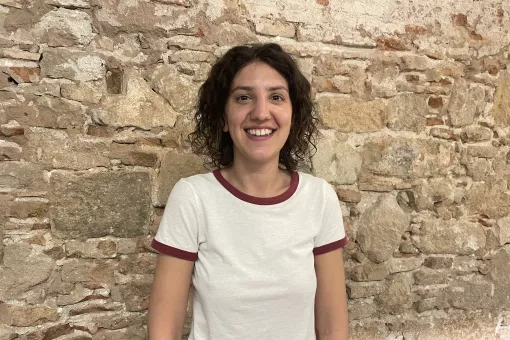Images
Have you ever felt like you are not offering the best version of yourself? Although her years in basic research were an enriching experience to her, then there came a time when her professional motivations changed. She then started a period of self-knowledge that led her to work in the pharmaceutical industry.
In her words, she is committed to improving the health of patients and their quality of life. And therefore, she aims to be an active part of technological development, generating new paths for the diagnosis, follow-up and treatment of patients.
We are talking about Marta Clemente, postdoc of the Development and Growth Control Laboratory until 2019 and now IRB Barcelona alumni, who explains what the profession of Clinical Research Associate (CRA) is about. An emerging profession and a career option for many people with academic scientific backgrounds.
What is a Clinical Research Associate (CRA)?
A CRA is the person who works as a link between the promoter of a clinical trial (usually a pharmaceutical company) and the hospitals (centers) where the trial is carried out.
The main tasks of a CRA are to ensure patient safety and to guarntee the quality of the trial data. To carry out these functions, CRAs visit the hospitals where the trials are carried out and verify that everything is being carried out in accordance with current legislation and following the established Protocol.
That is, to check if the patients included in the study meet all the inclusion criteria and none of the exclusion criteria, that the trial has been explained to them and they have consented to participate in it, that all the tests indicated in the Protocol have been carried out correctly and that there are no discrepancies between the data collected in the CRF (trial data collection notebook) and the patient's medical history.
In addition, they are responsible for training the research team in the clinical trial and for solving any issue that occurs in the center. For example: if the hospital has problems with any material that has been supplied (medication, laboratory material, equipment, etc.), if there is a deviation in the protocol (that is, a procedure has not been performed as specified the protocol), if a patient in the trial suffers an adverse effect, or if the center is not recruiting patients, etc.
To be a CRA it is important that you like to solve problems, be in contact with hospital staff (usually study coordinators, nurses , Pharmacists and Researchers), read Clinical Histories. You must be an orderly person to effectively manage all documents and contacts with hospitals and follow up on pending issues between visits. Normally CRAs travel 2 days a week to monitor in hospitals, which entails many trips and many hours alone. The rest of the days you usually work from home or at the office.
Did you ever imagine yourself working as a Clinical Research Associate?
I have always had a very strong vocation to help improve people's health, this is what led me to dedicate myself to research. But I admit that 3 years ago I did not know what a CRA was. With this I want to show how far apart we PhDs are many times from the world outside the Academy. This causes that, in many cases, we have a false feeling that we are not prepared to develop a job outside the bench.
Thanks to a workshop held by Carreras Científicas Alternativas, I understood that our capacities as scientists are completely transferable to other fields. For example, the ability we have to solve problems, to work in a team and autonomously at the same time, to undertake several tasks at the same time, or to face new challenges with a positive attitude and a restless mind.
The difficult thing, in my opinion, is knowing yourself and knowing what kind of work best suits your personality, way of working, professional and personal concerns, etc. When you stop and put your ideas into place, you realise that you really have much clearer than you imagined what kind of profession you were looking for.
In my case, this process took about 6 months of personal knowledge and contact with people who had left academy and who had taken up professions that seemed very interesting at first sight. Little by little, I narrowed the circle, until I decided on the world of clinical trials and, specifically, by the figure of the CRA.
Thanks to all this previous work, I feel very comfortable being a CRA because it is a job that I like, that fulfills me, that adapts to who I am. I have always felt very comfortable in positions that involve helping teams to carry out their work, managing and solving problems that arise on a day-to-day basis.
Do you think this is a profession that is especially in demand today?
The figure of the Clinical Research Associate has always been a key piece in clinical trials. Over the years, it has become a profession, and currently there are different professional categories for it, depending on the years of experience. Most of the CRAs work in companies called CROs (Clinical Research Organization) that serve pharmaceutical companies. Over the years, a senior CRA may apply to management positions such as Project Manager or Clinical Trial Manager.
Many PhDs choose to make the leap to the industry within the Medical Department (such as MSL, scientific manager, etc.) which a priori are the positions that can be most similar to our work as researchers. But in the Department of Clinical Operations (where CRAs work) there are also many job opportunities where a PhD can be a perfect fit. It depends on what type of job suits you best.
Currently, to qualify for most positions within the pharmaceutical industry you need a master's degree that allows you to do an internship in a company. In addition to the theoretical knowledge (legislation, procedures, etc.), the Master's degree helped me to meet great professionals in the sector from whom I learned a lot from both their experience and their professional careers.
On a professional level, how do you think IRB Barcelona has contributed to your current professional stage?
It has contributed on many levels. For example, the international and multicultural environment at IRB Barcelona allowed me to learn about different ways of thinking and working; very enriching. I also enjoyed and learned a lot in the BIST "Leadership in action" workshop, where for 3 days I shared experiences with postdocs who also wanted to continue their professional career beyond academy. In addition, the Tech Transfer team at IRB Barcelona helped me to find out about workshops, events and tools to function in the workplace.
There are more and more options to get to know the reality of the world of work outside academy and it is great that research centers and universities continue to work so that PhDs do not feel that sense of abyss when they consider leaving academy.
Nor should we forget that much of the work is inward, that is, self-knowledge of stopping to think what you would really like to do. Knowing how to align your abilities with a need. This does not happen from one day to the next, it is a long process where there are days better than others. Sometimes it also means taking a master's degree or some type of training, so you have to assess many aspects before deciding.
Tell us about "CRA Spain". How was it born and what are its objectives? What are the requirements to access?
During the months of confinement, a LinkedIn group called "CRA Spain" was founded whose objective is to create a meeting space between CRAs working in Spain. We believe that it is essential to give visibility to this essential figure in the EECC.
In this group we share content focused on the figure of the rehearsal monitor, tools to improve their day-to-day life, learn about career path options, interviews, etc. It is a private group focused on CRAs or people who are studying a Master's degree in Clinical Trials. In addition, we collaborate with colleagues on the web "(Des)ccoordinando un ensayo clínico" in the creation of an open forum where we can resolve questions and doubts about the EECC (Masters, companies where to work, etc. We encourage everyone to participate.
About IRB Barcelona
The Institute for Research in Biomedicine (IRB Barcelona) pursues a society free of disease. To this end, it conducts multidisciplinary research of excellence to cure cancer and other diseases linked to ageing. It establishes technology transfer agreements with the pharmaceutical industry and major hospitals to bring research results closer to society, and organises a range of science outreach activities to engage the public in an open dialogue. IRB Barcelona is an international centre that hosts 400 researchers and more than 30 nationalities. Recognised as a Severo Ochoa Centre of Excellence since 2011, IRB Barcelona is a CERCA centre and member of the Barcelona Institute of Science and Technology (BIST).






